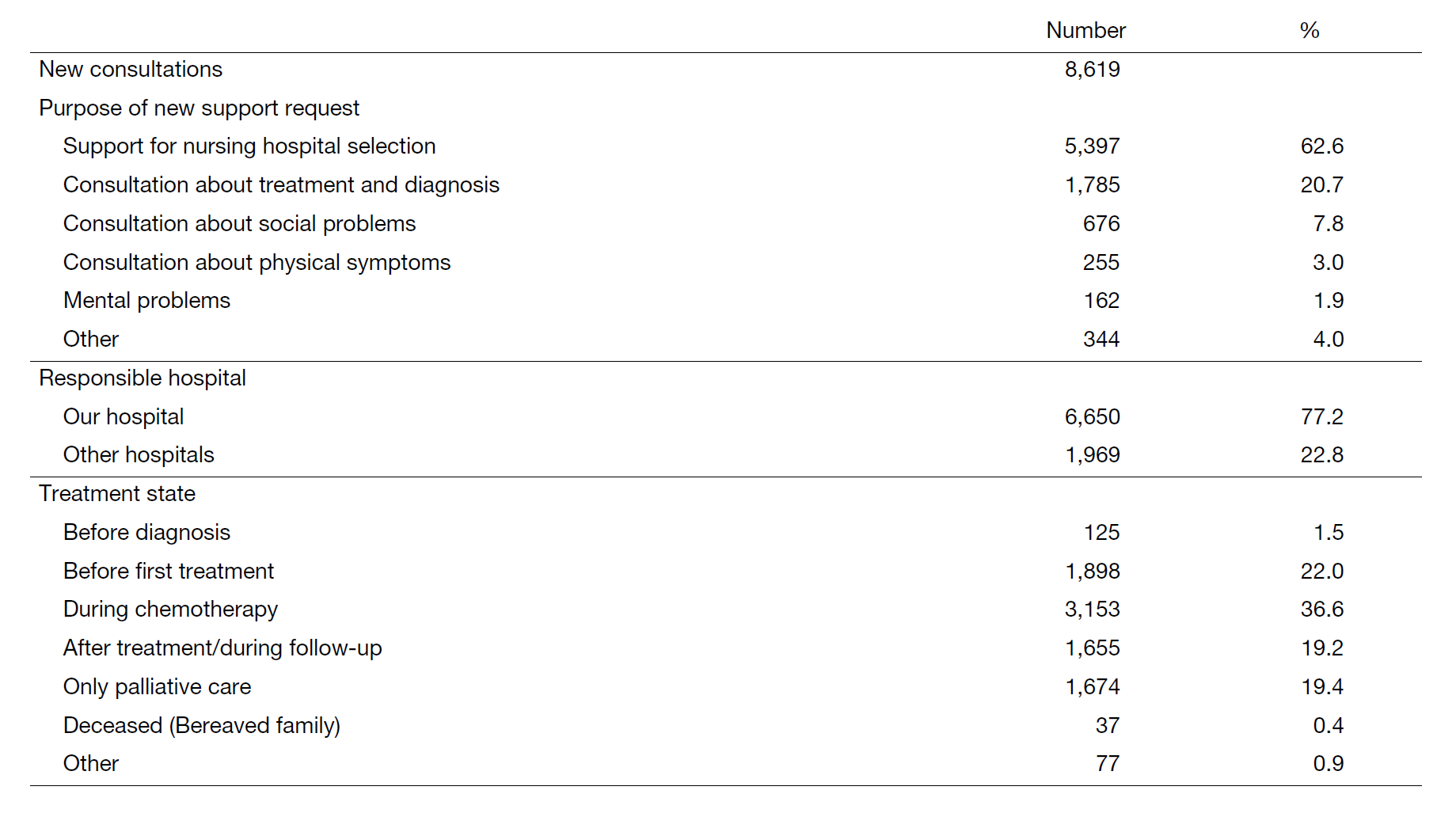Annual Report 2022
Supportive Care Center
Masafumi Ikeda, Hatoe Sakamoto, Kazue Hayasaka, Yoko Iida, Nahoko Kaneko, Nanaki Goto, Yuko Teshigawara, Tokiko Suzuki, Erika Sekine, Emi Takayama, Yuta Hirano, Yoshie Murata, Miiko Watanabe, Miwa Yamauchi, Megumi Yamaguchi
Introduction
The Supportive Care Center was established as an organization to provide, in addition to conventional consultation support, positive and comprehensive support from a variety of professional occupations for actual or potential physical, mental, and social problems that cancer patients and their families confront. Our main activities are the establishment of a continuous support system for patients and their families, the enhancement of a home care support system, and the promotion of community cooperation for establishing early palliative care.
The Team and What We Do
1. Consultation support/community medicine cooperation
In 2022, we received 8,619 (up 27.9% over 2021) new consultations. Among them, 6,650 (77.2%) were from patients who had received medical treatment in our hospital, or their families, and 1,969 (22.8%) were from patients who had received medical treatment at other medical institutions, or their families (Table 1).
Since 2014, we have been organizing and conducting multidisciplinary collaborative programs to improve the quality of life of patients
Table 1. Details of the consultation support provided in 2022

diagnosed with cancer as well as the patients’ families. With no end to COVID-19 that began in 2020 in sight, a full-scale online promotion of related information was initiated in the fiscal year 2021. Various webinars for multidisciplinary collaboration aimed at improving the quality of life of patients and their families were conducted. In the fiscal year 2022, 24 videos were released, which obtained 150,894 views. In addition, two support seminars for patients with cancer were held, which drew the participation of 1,320 people from across Japan.
Online study sessions on palliative care were held for community health and welfare workers involved in this line of work. The sessions were held three times in FY2022, with a total of 1,722 participants from 47 prefectures.
As a result of this initiative, the number of participants in various seminars has expanded to patients, families, business establishments, and educators in 47 prefectures in Japan. In the future, we plan to improve the system so that valuable information can be delivered to all those who need it across regions and positions.
2. Employment support
Working in collaboration with Hello Work as well as with licensed social insurance labor consultants and occupational health support centers, we have extended support for a total of 433cases to facilitate a balance between work and treatment for patients suffering from cancer.
3. Prevention program to improve job turnover rate for cancer patients
A summary was given of "Practical Research on Continuation of Work and Return to Work Programs to Realize Decent Work for Cancer Patients" (Grant-in-Aid for Scientific Research on Health, Labour and Welfare), selected in FY2020. The results indicated that the web-based implementation of the work-life balance support program caused a ripple effect in terms of both the number of users and their demographics. However, it was found that the improvement was limited in areas lacking essential healthcare workers. Professionals in the consultation support sector experienced a lack of practical experience and learning opportunities for employment support. The study also identified emerging needs for new online employment systems, including reduced working hours and job sharing, taking into account long-term activity limitations due to late-stage complications in individuals with no prior work experience or engaged in irregular employment.
Future Prospects
Starting from October 2022, as part of the practice of palliative care from the time of diagnosis, various support needs were identified using the "Questionnaire on Life in Treatment" for all newly diagnosed patients to facilitate support through a multidisciplinary approach. In the future, a quantitative evaluation will be conducted after a certain period to consider more appropriate operational approaches.
